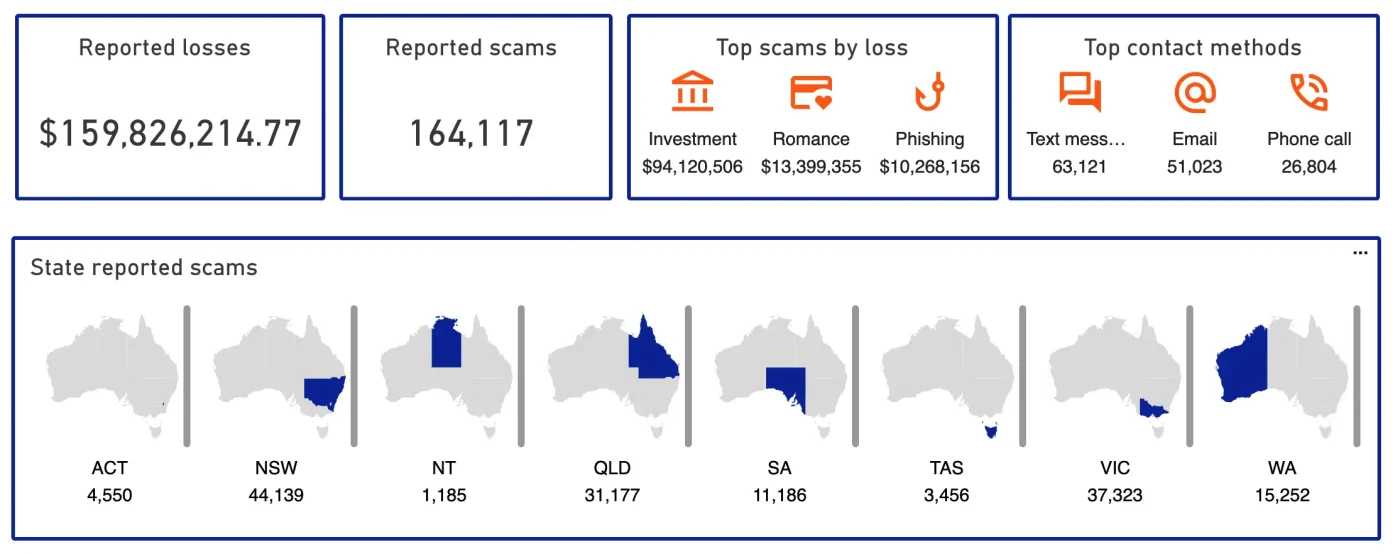Home » Scam Awareness Week 2024
I want to draw attention to a topic that is very dear to me.
The Australian Competition and Consumer Commission (ACCC) is running the Scam Awareness Week 2024 from August 26 to August 30.
The initiative calls attention to the ever-present threat of scams and highlights the importance of community awareness. With the theme “Share a story, stop a scam,” the campaign emphasises the need for vigilance and education to combat the tactics scammers use to deceive and exploit people.
By understanding the most common types of scams and their impact, we can better protect ourselves and those around us.

Sam, Medic Cloud Managing Director
Common types of scams
Scams take various forms, each designed to deceive unsuspecting individuals. In the spirit of Scam Awareness Week 2024, I want to help point out some of the more common scam types that exist and how we can identify them.
Here are some of the most common scams affecting us today:
Phishing scams
Scammers send fraudulent emails or messages that appear to be from legitimate companies, asking recipients to provide personal information such as passwords or credit card details. For example, the “Hey Mum” scam involves criminals impersonating family members to gain trust and extract money or information. These messages can appear in messaging applications on your smartphone and social media. To help decipher if such messages are legitimate, it might be worth establishing a secret passcode or secret phrase between family to verify if it really is your family member.
Technical support scams
Criminals pose as technical support agents from well-known companies, convincing victims that their computers are infected with viruses. They charge for unnecessary services or steal personal information, causing financial and emotional damage. These scammers generally highlight the urgency to do a task quickly. This includes processing your credit card details over the phone or changing a setting on your computer. If you are pressured to do something in such a situation, there is a big chance that it is a scam. For businesses, managed Information Technology (IT) services reduces the risk of this type of scam.
Junk email scam
Scammers flood your email inbox with a barrage of junk mail in an attempt to bury important notifications among the clutter. Hidden within these irrelevant messages, you may receive a legitimate email such as a password reset notification or a message confirming that your banking details have been changed. The goal is to make you miss these critical alerts. By the time you realise something’s wrong, the scammers may have already gained unauthorised access to your accounts. To protect yourself, regularly check your inbox for important emails, even if it’s full of spam. Additionally, consider setting up filters and using email management tools to prioritise alerts from trusted senders.
Investment scams
Fraudsters entice victims with promises of high returns and low risks, often involving fake investment schemes. Cryptocurrency scams have surged, preying on the excitement surrounding digital currencies to steal from investors. The old saying goes “If it’s too good to be true then it probably really is too good to be true.” You may want to see independent financial advice to verify the legitimacy of the investment.
Romance scams
According to the Australian Institute of Family Studies, one in four Australians are single. This is approximately 26% of the population. With this statistic in mind, scammers create fake profiles on dating websites and social media platforms to form relationships with victims and target Australians. Once trust is established, they request money, usually claiming it’s for a personal emergency, leaving victims heartbroken and financially drained. It’s good to see dating apps doing more to identify scams but you still need to be careful if you use the apps.
Scam quiz – how savvy are you?
Test your knowledge of common online scams and see how you can protect yourself from being scammed. This is an external quiz managed by Consumer Affairs Victoria..
Snapshot of Australian scam data in 2024
What impact can scams have?
Scams inflict much more than just financial losses. Victims often suffer from intense emotional distress, including shame, guilt, and embarrassment. These feelings can be particularly damaging for vulnerable individuals, such as the elderly or those experiencing significant life changes.
On a broader scale, scams undermine trust in online platforms and digital transactions. As fraudulent activities increase, people may become wary of using online services, which could hinder the growth of digital economies and reduce access to essential online resources.
The importance of reporting and sharing
Scam Awareness Week 2024 emphasises the importance of reporting scams and sharing experiences. Scamwatch data reveals that over 92% of people who report scams do not suffer financial losses, proving that early detection and intervention can prevent significant harm.
By sharing stories and experiences, we can help others recognise potential scams before they fall victim. Reducing the stigma associated with being scammed is crucial—when people feel comfortable discussing their experiences, they help create a more informed and vigilant community.
Protect yourself from scams
No matter how much you invest in the world’s best security applications and hardware, the weakest link in cybersecurity is often human error. To safeguard yourself and others from scams, it’s essential to stay informed and adopt best practices for online safety:
- Verify before trusting: Always verify the source of any unsolicited messages or phone calls. If in doubt, contact the company, Government agency or person directly using known contact information.
- Be cautious with personal information: Avoid sharing sensitive information, such as passwords or financial details, unless you are certain of the recipient’s identity.
- Educate yourself and others: Stay updated on the latest scam tactics and share this knowledge with friends and family, especially those who may be more vulnerable.
- Software tools: Consider installing credible antivirus and Virtual Private Network (VPN) software to help identify websites with viruses and anonymising your online sessions.
Scams are increasingly sophisticated, and even the most vigilant individuals can be deceived. That’s why it’s crucial to remember that seeking help from your IT team is not a sign of weakness or incompetence—it’s a smart move. The scammers are constantly evolving their tactics, and asking for assistance can make the difference between falling victim to an attack and staying secure.
Scam Awareness Week 2024 reminds us that scams are a serious issue with far-reaching consequences. By staying vigilant, reporting suspicious activities, and sharing our stories, we can protect ourselves and help build a safer community. Remember, your story could prevent the next scam from succeeding.
For more information and resources on Scam Awareness Week, visit the official Scamwatch website.
To obtain a health check about how secure your business is from scams contact us at Medic Cloud at 1300 658 103.
Read more blogs

Subscribe to Medic Hub
Get the latest insights direct to your inbox.




